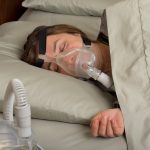
People who have sleep apnea may have another issue to worry about — weaker bones and teeth. Known as low bone-mineral density, the condition is an indicator of osteoporosis and can increase the risk of fractures and cause teeth to become loose and dental implants to fail, according to new research from the University at Buffalo (UB) in New York. To study this, researchers used cone beam computed tomography (CBCT) — a type of X-ray — to measure bone density in the heads and necks of 38 adults. Half of the study participants had sleep apnea. These scans found that participants with sleep apnea had significantly lower bone-mineral density than the participants without the condition. Sleep apnea can cause difficulty breathing while asleep, which can lead to low levels of oxygen in the body, inflammation, oxidative stress and shortened breathing patterns. These symptoms may each have a chronic negative effect on bone metabolism and eventually bone density, said senior author Dr. Thikriat Al-Jewair. She is an associate professor of orthodontics in the UB School of Dental Medicine and director of the school’s Advanced Education Program in Orthodontics. “While the link between obstructive sleep apnea and low bone-mineral density has yet to be fully explored, this study offers new evidence on their connection that could have several implications for orthodontic treatment,” Al-Jewair said in a university… read on > read on >



























-300x200.jpg)










